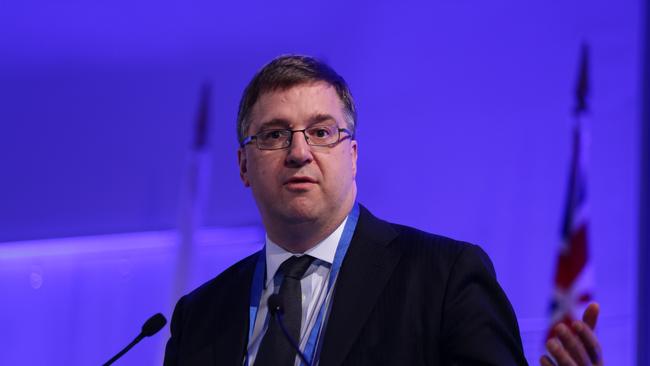Super chief warns of a messy coronavirus exit
The chair of HESTA’s investment committee has warned investors to be cautious about buying shares again.

The chair of industry fund giant HESTA’s investment committee and former Future Fund chief executive Mark Burgess has warned investors to be cautious about buying shares again amid what he expects will be a “messy exit” for Australia from the coronavirus pandemic.
Mr Burgess, who is also the chairman of bond manager Jamieson Coote Bonds and fund manager Yarra Capital Management, also said he was concerned about the foundations for the nation’s future economic growth and claimed foreign investors were starting to look at more diversified economies to house their funds.
“I do fear that people are pricing in a ‘V’ or ‘W-shaped’ recovery that will get us through this period before things like balance sheets come back to hurt us one more time … I do think it is going to be a messy exit (from the current crisis),” Mr Burgess told a forum hosted by Hamilton Wealth Partners on Thursday.
The global sharemarket is still around 20 per cent above its bear market low after unprecedented fiscal and monetary and stimulus by governments and central banks around the world over recent weeks.
But Mr Burgess said there were too many fund managers who wanted to “buy the dips” in the sharemarket as opposed to thinking through the crisis and sticking to an investment process.
The investment portfolios of many “poor managers”, he said, had been helped by falling interest rates over the past decade, with rates now likely to trade sideways for a sustained period.
“I would be a bit careful about the process of re-entering the markets. When you do re-enter, it will be painful so you need a good process,’’ he said.
Mr Burgess stressed he was “not bearish per se” on markets and said the pullback during the first quarter would provide opportunities, but that the timing of re-entry was critical.
The IMF has forecast a 6.7 per cent contraction in Australia’s economic output this year, the worst since the Great Depression in 1931, before a strong 6.1 per cent rebound in 2021.
But economists have criticised its optimism and Mr Burgess said too much of Australia’s recent economic growth had simply been driven by immigration.
“Australia’s economic complexity has been deteriorating. We have been becoming less and less complex and less and less diversified. I am personally concerned we are not generating the new industries to support and drive immigration and growth in the future,’’ he said. “Investors are starting to see that lack of diversification and are looking to reposition in other markets.”
Australia’s population grew by 371,000, or 1.5 per cent, to 25.46 million over the year to last September, of which 63 per cent was due to net overseas migration.
The Australian reported on Thursday that the coronavirus was driving the biggest population decline in Australian history, with 300,000 tourists, temporary workers and students having departed the country so far this year, with a similar number set to follow by year’s end.
“The population growth may have to stop here for some period and that will have effects on a range of sectors,’’ Mr Burgess said, noting the housing market was “expensive”, “overset” and “due for a setback”.
“We are in a somewhat sticky position,” he said.
While he stressed he was appearing at the forum in his capacity as JCB chairman and not as a director of HESTA, Mr Burgess implored the federal government to “stop kicking” the superannuation industry.
“I hope that our policymakers stop kicking it around. As a country we have struggled to raise capital and now we have three trillion (dollars) of savings. I’d rather as a country have three trillion dollars of savings in the current situation,’’ he said.
Industry-aligned superannuation funds such as HESTA have rebuffed claims that they represent a “structural weakness” in the $3 trillion retirement savings system because of the illiquid nature of some of their investments.
The criticism surfaced after the federal government gave stood-down workers early access to their super savings.
The government expects that up to $27bn will be withdrawn from super after the Australian Taxation Office begins processing early access requests.




To join the conversation, please log in. Don't have an account? Register
Join the conversation, you are commenting as Logout